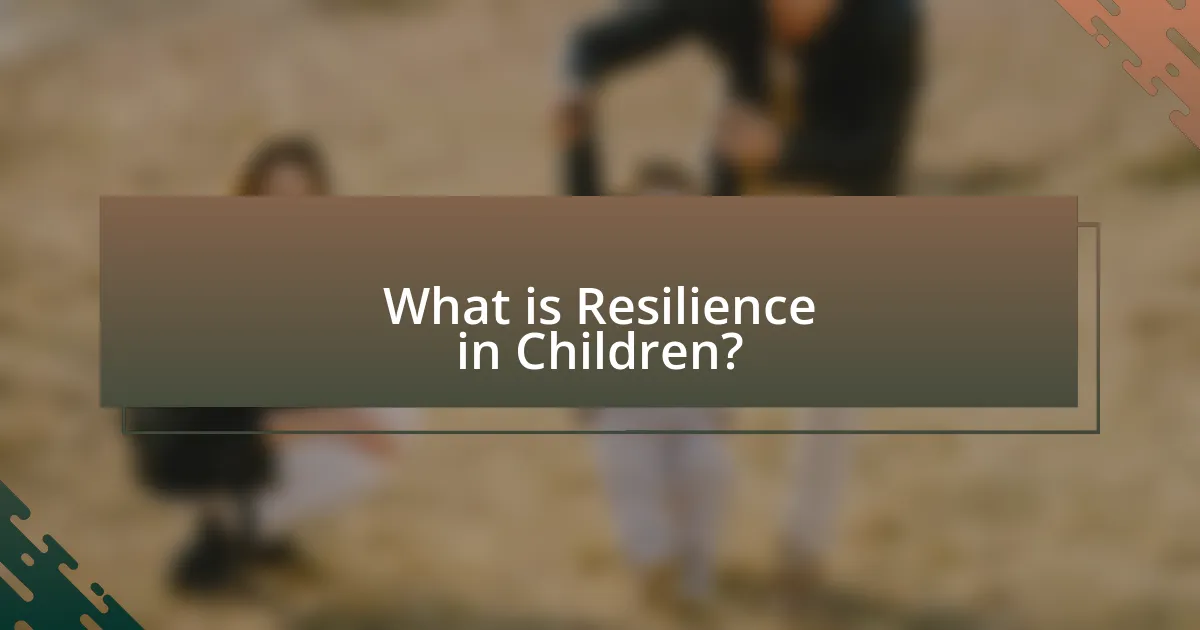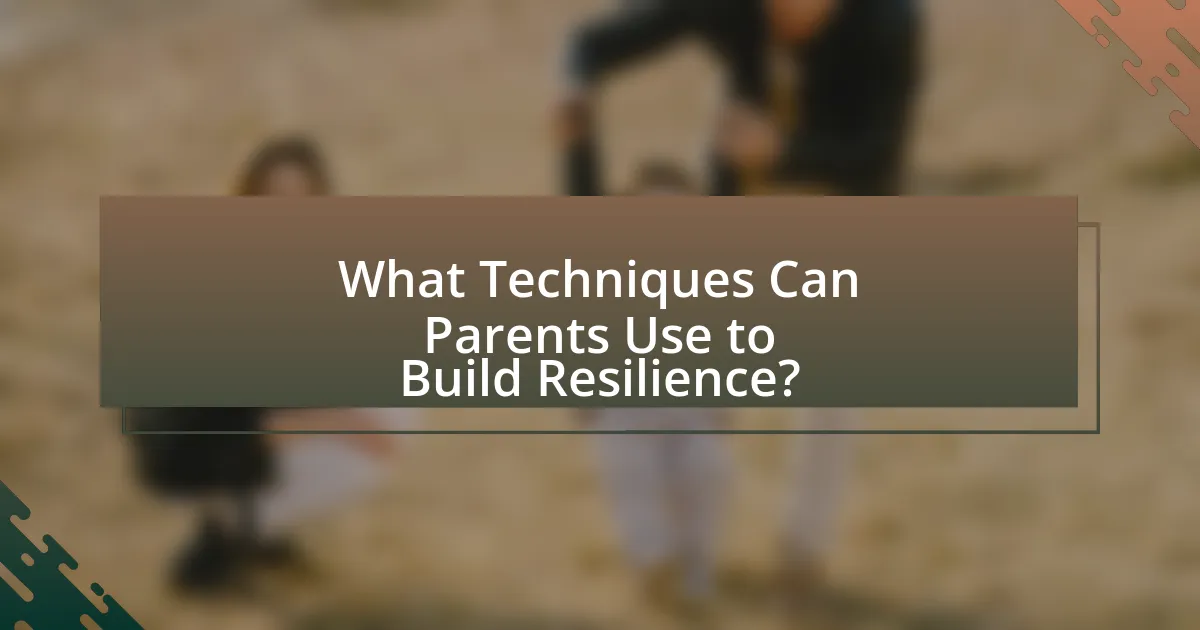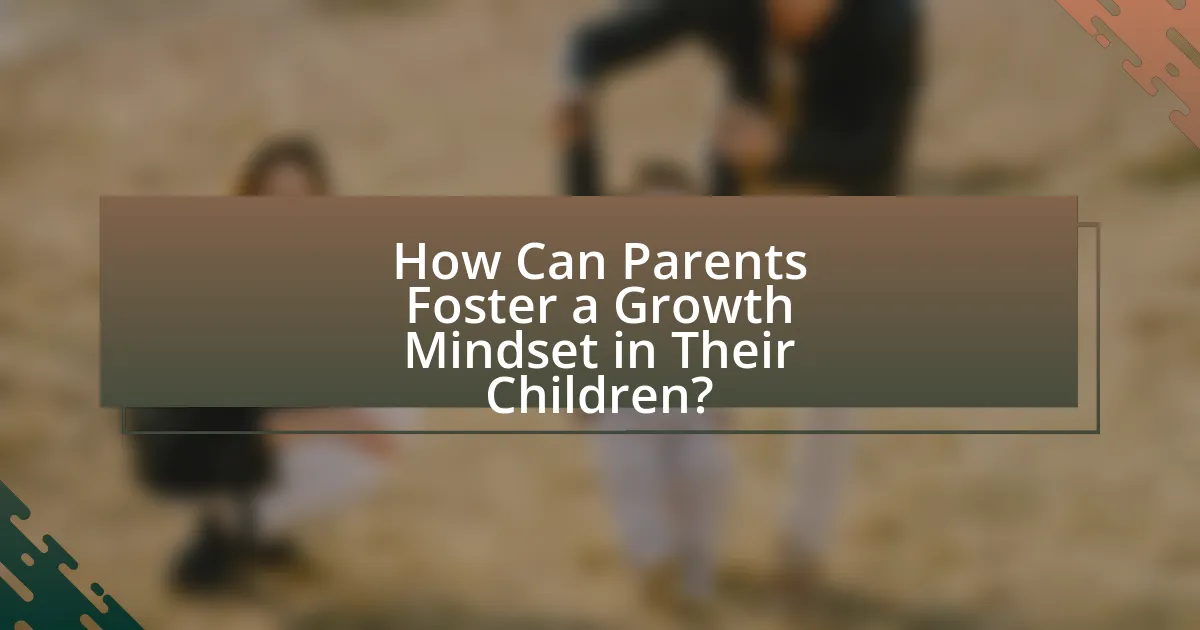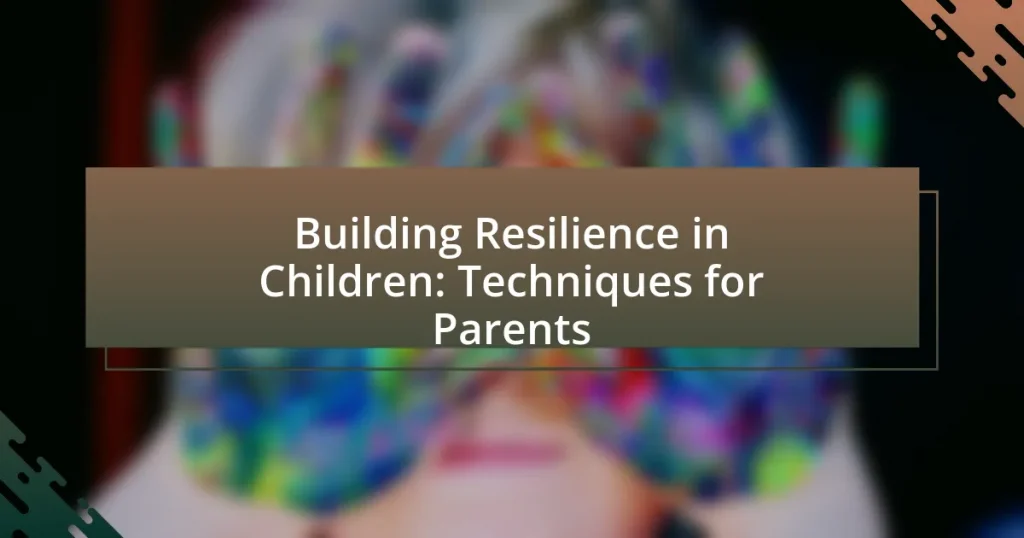Building resilience in children is the focus of this article, which explores the ability of children to adapt and recover from adversity, stress, and challenges. Key characteristics of resilient children include emotional regulation, problem-solving skills, and social competence, all of which contribute to their overall well-being and academic success. The article outlines various factors that foster resilience, such as supportive relationships, a nurturing environment, and effective coping strategies. Additionally, it provides practical techniques for parents to encourage resilience, including promoting a growth mindset, teaching problem-solving skills, and creating safe spaces for emotional expression. By implementing these strategies, parents can significantly enhance their children’s capacity to cope with life’s challenges.

What is Resilience in Children?
Resilience in children is the ability to adapt and recover from adversity, stress, or challenges. This capacity enables children to cope with difficulties, maintain emotional stability, and develop problem-solving skills. Research indicates that resilient children often exhibit traits such as optimism, perseverance, and social competence, which contribute to their ability to navigate life’s challenges effectively. Studies show that fostering resilience can lead to better mental health outcomes and improved academic performance, highlighting its importance in child development.
How is resilience defined in the context of child development?
Resilience in the context of child development is defined as the ability of a child to adapt positively in the face of adversity, trauma, or significant stress. This capacity enables children to overcome challenges and bounce back from difficult experiences, which is crucial for their emotional and psychological growth. Research indicates that resilient children often exhibit strong problem-solving skills, emotional regulation, and social competence, which are essential for navigating life’s challenges effectively. Studies, such as those conducted by the American Psychological Association, highlight that resilience can be fostered through supportive relationships, positive role models, and effective coping strategies, reinforcing the importance of a nurturing environment in promoting resilience among children.
What are the key characteristics of resilient children?
Resilient children exhibit key characteristics such as emotional regulation, problem-solving skills, social competence, and a strong sense of self-efficacy. Emotional regulation allows them to manage their feelings effectively, which is crucial during stressful situations. Problem-solving skills enable them to navigate challenges and find solutions, fostering independence. Social competence helps them build and maintain healthy relationships, while a strong sense of self-efficacy instills confidence in their abilities to overcome obstacles. Research indicates that these traits contribute to better coping strategies and overall mental health in children, reinforcing the importance of fostering resilience from an early age.
Why is resilience important for children’s overall well-being?
Resilience is crucial for children’s overall well-being because it enables them to cope with challenges and bounce back from adversity. Children with resilience are better equipped to handle stress, develop healthy relationships, and achieve academic success. Research indicates that resilient children exhibit lower levels of anxiety and depression, which contributes to their emotional and mental health. For instance, a study published in the Journal of Child Psychology and Psychiatry found that resilience is linked to positive outcomes in social competence and academic performance, highlighting its importance in fostering a well-rounded development.
What factors contribute to building resilience in children?
Factors that contribute to building resilience in children include supportive relationships, emotional regulation skills, and a growth mindset. Supportive relationships, such as those with parents, teachers, and peers, provide children with a sense of security and belonging, which is essential for developing resilience. Emotional regulation skills enable children to manage their emotions effectively, helping them cope with stress and adversity. A growth mindset, characterized by the belief that abilities can be developed through effort and learning, encourages children to embrace challenges and persist in the face of setbacks. Research indicates that children with these factors are better equipped to handle difficulties and bounce back from challenges, as evidenced by studies showing that supportive environments and emotional intelligence correlate with higher resilience levels.
How do family dynamics influence a child’s resilience?
Family dynamics significantly influence a child’s resilience by shaping their emotional and social development. Positive family interactions, such as supportive communication and consistent parenting, foster a secure environment that encourages children to face challenges with confidence. Research indicates that children from nurturing families exhibit higher resilience levels, as they learn problem-solving skills and emotional regulation through healthy family relationships. For instance, a study published in the Journal of Family Psychology found that children who experience strong familial support are better equipped to cope with stress and adversity, demonstrating the critical role family dynamics play in building resilience.
What role does a child’s environment play in fostering resilience?
A child’s environment plays a crucial role in fostering resilience by providing the necessary support systems and experiences that help them navigate challenges. Environments that are nurturing, stable, and rich in positive relationships contribute to a child’s ability to cope with adversity. Research indicates that children who grow up in supportive environments, characterized by caring adults and consistent routines, are more likely to develop strong coping skills and emotional regulation. For instance, a study published in the journal “Child Development” by Masten and Coatsworth (1998) found that children with access to supportive relationships and resources are better equipped to handle stress and recover from setbacks. This evidence underscores the importance of a positive environment in building resilience in children.

What Techniques Can Parents Use to Build Resilience?
Parents can build resilience in children by fostering a supportive environment, encouraging problem-solving skills, and promoting emotional regulation. Creating a safe space allows children to express their feelings and face challenges without fear of judgment. Teaching problem-solving skills helps children learn to navigate obstacles effectively, enhancing their ability to cope with adversity. Additionally, promoting emotional regulation through techniques such as mindfulness or deep breathing enables children to manage stress and anxiety. Research indicates that children who experience supportive parenting and learn these skills are more likely to develop resilience, as evidenced by studies showing improved coping strategies and emotional well-being in resilient children.
How can parents encourage problem-solving skills in their children?
Parents can encourage problem-solving skills in their children by providing opportunities for independent thinking and decision-making. Engaging children in age-appropriate challenges, such as puzzles or open-ended questions, fosters critical thinking. Research indicates that children who are allowed to explore solutions on their own develop stronger problem-solving abilities. For instance, a study published in the Journal of Educational Psychology found that children who participated in problem-based learning showed significant improvement in their analytical skills compared to those who did not. Additionally, parents can model problem-solving by verbalizing their thought processes when faced with challenges, demonstrating how to approach problems methodically.
What activities promote critical thinking and independence?
Activities that promote critical thinking and independence include problem-solving tasks, open-ended discussions, and project-based learning. Problem-solving tasks encourage children to analyze situations, evaluate options, and make decisions, fostering independence. Open-ended discussions allow children to express their thoughts and challenge ideas, enhancing their critical thinking skills. Project-based learning engages children in real-world challenges, requiring them to research, collaborate, and create solutions, which further develops their ability to think critically and act independently. Research indicates that these activities not only enhance cognitive skills but also build resilience, as children learn to navigate challenges and develop self-efficacy.
How can parents model effective problem-solving behaviors?
Parents can model effective problem-solving behaviors by demonstrating a structured approach to challenges. This involves identifying the problem, brainstorming potential solutions, evaluating the options, and implementing a chosen solution while reflecting on the outcome. Research indicates that children learn through observation; when parents actively engage in problem-solving, they provide a live demonstration of critical thinking and resilience. For instance, a study published in the Journal of Family Psychology found that children whose parents modeled problem-solving strategies were more likely to develop similar skills, enhancing their ability to cope with difficulties.
What role does emotional support play in resilience building?
Emotional support plays a critical role in resilience building by providing individuals with the necessary encouragement and validation during challenging times. This support fosters a sense of safety and belonging, which is essential for children to develop coping mechanisms and adaptive strategies. Research indicates that children who receive consistent emotional support from parents or caregivers are more likely to exhibit resilience, as they feel understood and valued, enabling them to navigate stressors effectively. For instance, a study published in the Journal of Child Psychology and Psychiatry found that emotional support significantly correlates with improved emotional regulation and problem-solving skills in children, highlighting its importance in fostering resilience.
How can parents create a safe space for emotional expression?
Parents can create a safe space for emotional expression by actively listening to their children without judgment. This involves giving full attention, validating their feelings, and encouraging open dialogue about emotions. Research indicates that children who feel heard and understood are more likely to develop emotional resilience and healthier coping mechanisms. For instance, a study published in the Journal of Child Psychology and Psychiatry found that supportive parenting practices significantly enhance children’s emotional regulation skills. By fostering an environment where children feel safe to express their emotions, parents contribute to their overall emotional well-being and resilience.
What techniques can parents use to validate their child’s feelings?
Parents can validate their child’s feelings by actively listening, acknowledging emotions, and using reflective statements. Active listening involves giving full attention to the child, which helps them feel heard and understood. Acknowledging emotions means recognizing and naming what the child is feeling, such as saying, “I can see that you’re really upset.” Reflective statements, like “It sounds like you’re feeling frustrated because your friend didn’t want to play,” help children articulate their feelings and understand that their emotions are valid. Research indicates that emotional validation fosters resilience and emotional intelligence in children, contributing to their overall well-being.

How Can Parents Foster a Growth Mindset in Their Children?
Parents can foster a growth mindset in their children by encouraging effort over innate ability. This approach involves praising children for their hard work, persistence, and strategies rather than their intelligence or talent. Research by Carol Dweck, a psychologist at Stanford University, shows that children who receive praise for effort are more likely to embrace challenges and learn from failures, leading to greater resilience and achievement. Additionally, parents can model a growth mindset by sharing their own learning experiences and demonstrating how to overcome obstacles, reinforcing the idea that abilities can be developed through dedication and hard work.
What is a growth mindset and why is it important for resilience?
A growth mindset is the belief that abilities and intelligence can be developed through dedication and hard work. This mindset is crucial for resilience because it encourages individuals, particularly children, to view challenges as opportunities for growth rather than insurmountable obstacles. Research by Carol Dweck, a psychologist at Stanford University, demonstrates that children with a growth mindset are more likely to persevere in the face of difficulties, leading to greater resilience. This adaptability allows them to bounce back from setbacks and maintain motivation, ultimately fostering a more robust approach to learning and personal development.
How can parents encourage a positive attitude towards challenges?
Parents can encourage a positive attitude towards challenges by modeling resilience and providing supportive feedback. When parents demonstrate how to approach difficulties with a growth mindset, children learn to view challenges as opportunities for learning rather than obstacles. Research indicates that children who observe their parents tackling challenges with perseverance are more likely to adopt similar attitudes; for instance, a study published in the Journal of Child Psychology and Psychiatry found that parental encouragement significantly correlates with children’s resilience and problem-solving skills. By praising effort rather than just outcomes, parents reinforce the idea that persistence is valuable, further fostering a positive perspective on challenges.
What language should parents use to promote a growth mindset?
Parents should use language that emphasizes effort, learning from mistakes, and the value of persistence to promote a growth mindset. For example, instead of saying “You’re so smart,” parents can say “I’m proud of how hard you worked on that problem.” This shift in language encourages children to focus on their efforts and the process of learning rather than solely on innate ability. Research by Carol Dweck, a psychologist at Stanford University, supports this approach, showing that praising effort rather than intelligence fosters resilience and a willingness to tackle challenges.
How can parents teach coping strategies to their children?
Parents can teach coping strategies to their children by modeling healthy emotional responses and providing practical tools for managing stress. For instance, parents can demonstrate deep breathing exercises during stressful situations, which research shows can effectively reduce anxiety levels in children. Additionally, engaging children in problem-solving discussions when they face challenges helps them develop critical thinking skills and resilience. Studies indicate that children who learn to articulate their feelings and explore solutions are better equipped to handle adversity. By consistently reinforcing these strategies through everyday interactions, parents can foster a supportive environment that encourages emotional growth and resilience.
What are effective coping techniques for children facing stress?
Effective coping techniques for children facing stress include deep breathing exercises, physical activity, and creative expression. Deep breathing helps children calm their minds and bodies, reducing anxiety levels. Research indicates that physical activity, such as playing sports or dancing, releases endorphins, which improve mood and alleviate stress. Creative expression through art, music, or writing allows children to process their emotions and communicate feelings they may struggle to articulate verbally. These techniques are supported by studies showing that children who engage in such activities demonstrate improved emotional regulation and resilience in stressful situations.
How can parents help children practice these coping strategies?
Parents can help children practice coping strategies by modeling these behaviors themselves and creating a supportive environment. By demonstrating effective coping techniques, such as deep breathing or positive self-talk during stressful situations, parents provide a live example for children to emulate. Additionally, engaging children in role-playing scenarios can reinforce these strategies, allowing them to practice in a safe space. Research indicates that children learn best through observation and practice, making parental involvement crucial in developing resilience. A study published in the Journal of Child Psychology and Psychiatry found that children whose parents actively teach and model coping strategies exhibit better emotional regulation and resilience.
What are some common challenges parents face in building resilience?
Parents commonly face challenges such as lack of knowledge about resilience-building strategies, difficulty in modeling resilient behaviors, and managing their own stress levels. Research indicates that many parents are unaware of effective techniques to foster resilience, which can hinder their children’s ability to cope with adversity. Additionally, parents often struggle to demonstrate resilience themselves, as their own emotional responses can impact their children’s learning. A study published in the Journal of Child Psychology and Psychiatry highlights that parental stress can negatively affect parenting practices, further complicating efforts to instill resilience in children.
How can parents overcome obstacles in fostering resilience?
Parents can overcome obstacles in fostering resilience by actively modeling positive coping strategies and providing a supportive environment. Research indicates that children learn resilience through observation; when parents demonstrate effective problem-solving and emotional regulation, children are more likely to adopt these behaviors themselves. Additionally, creating a safe space for open communication allows children to express their feelings and challenges, which is essential for developing resilience. Studies show that children who feel supported by their parents are better equipped to handle adversity, as they perceive challenges as opportunities for growth rather than threats.
What resources are available for parents seeking guidance?
Parents seeking guidance can access various resources, including parenting books, online courses, and support groups. Notable books such as “The Whole-Brain Child” by Daniel J. Siegel and Tina Payne Bryson provide insights into child development and resilience-building techniques. Online platforms like Coursera and Udemy offer courses on parenting strategies, while organizations such as the American Psychological Association provide articles and resources focused on child psychology and resilience. Additionally, local community centers often host workshops and support groups that facilitate discussions among parents, enhancing their skills in fostering resilience in children.
What practical tips can parents implement to build resilience in their children?
Parents can build resilience in their children by encouraging problem-solving skills and fostering a growth mindset. Teaching children to approach challenges as opportunities for learning helps them develop the ability to cope with setbacks. Research indicates that children who are taught to view failures as learning experiences are more likely to persist in the face of difficulties. Additionally, providing a supportive environment where children feel safe to express their emotions and take risks contributes to their emotional strength. Studies show that children with strong emotional support systems are better equipped to handle stress and adversity.
